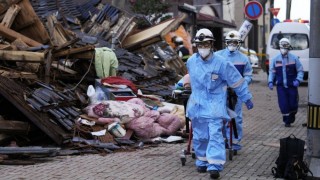Loading
Search
▼ Japan earthquake: Nearly 250 missing as hope for survivors fades
- Category:Other
Rescuers in Japan are rushing to find 242 people missing after a devastating New Year's Day earthquake.
A critical 72-hour period to find survivors from when the quake struck ended late on Thursday.
On Friday, the death toll from the 7.6 magnitude earthquake in the remote Noto peninsula rose to 92.
Japan's Self-Defense Forces doubled the number of troops taking part in rescue and relief to 4,600, Kyodo news agency reported.
Many people are thought to be trapped under their collapsed homes - mostly in the towns of Suzu and Wajima. The wooden structures were not built to withstand powerful earthquakes that frequently plague the country.
Tens of thousands of residents are still without power and water, while hundreds remain isolated from help because of landslides and blocked roads.
"We will not give up," Japanese Prime Minister Fumio Kishida said after a meeting with disaster response officials on Friday.
Mr Kishida urged rescue and relief workers to leave nostone unturned in reaching the affected communities.
"The biggest challenge for us is the access. Most disastrous areas are difficult to reach because of the rocks on the roads and landslides caused by the rain and the aftershocks," said Musubi Yata from the Japanese Red Cross Society.
"When there were aftershocks, we had to stop and leave some medical activities because the roads may collapse," she told the BBC.
The earthquake on Monday evening also triggered a small tsunami that flooded at least 296 acres (120 ha) of land, according to Japan's land ministry.
Japan had said it would spend 4.74 billion yen ($34m; £27m) in budget reserves to assist the victims.
Photos posted by the Japan Ground Self Defense Force showed troops loading food, drinking water and toiletries on to trucks that were lined up on the road. Troops can also be seen clearing mud and debris from landslide-hit roads.
In another photo, troops were shown carrying a survivor on a stretcher over a snow-covered trail.
The BBC saw extensive destruction on a visit to Wajima on Wednesday, where some homes and vehicles were crushed under crumbling concrete. Many of the town's old, traditional wooden homes had collapsed.
The town with a population of 23,000 now resembles a ghost town as most heeded early evacuation warnings, when tsunamis were forecast.
A critical 72-hour period to find survivors from when the quake struck ended late on Thursday.
On Friday, the death toll from the 7.6 magnitude earthquake in the remote Noto peninsula rose to 92.
Japan's Self-Defense Forces doubled the number of troops taking part in rescue and relief to 4,600, Kyodo news agency reported.
Many people are thought to be trapped under their collapsed homes - mostly in the towns of Suzu and Wajima. The wooden structures were not built to withstand powerful earthquakes that frequently plague the country.
Tens of thousands of residents are still without power and water, while hundreds remain isolated from help because of landslides and blocked roads.
"We will not give up," Japanese Prime Minister Fumio Kishida said after a meeting with disaster response officials on Friday.
Mr Kishida urged rescue and relief workers to leave nostone unturned in reaching the affected communities.
"The biggest challenge for us is the access. Most disastrous areas are difficult to reach because of the rocks on the roads and landslides caused by the rain and the aftershocks," said Musubi Yata from the Japanese Red Cross Society.
"When there were aftershocks, we had to stop and leave some medical activities because the roads may collapse," she told the BBC.
The earthquake on Monday evening also triggered a small tsunami that flooded at least 296 acres (120 ha) of land, according to Japan's land ministry.
Japan had said it would spend 4.74 billion yen ($34m; £27m) in budget reserves to assist the victims.
Photos posted by the Japan Ground Self Defense Force showed troops loading food, drinking water and toiletries on to trucks that were lined up on the road. Troops can also be seen clearing mud and debris from landslide-hit roads.
In another photo, troops were shown carrying a survivor on a stretcher over a snow-covered trail.
The BBC saw extensive destruction on a visit to Wajima on Wednesday, where some homes and vehicles were crushed under crumbling concrete. Many of the town's old, traditional wooden homes had collapsed.
The town with a population of 23,000 now resembles a ghost town as most heeded early evacuation warnings, when tsunamis were forecast.
- January 5, 2024
- Comment (0)
- Trackback(0)


